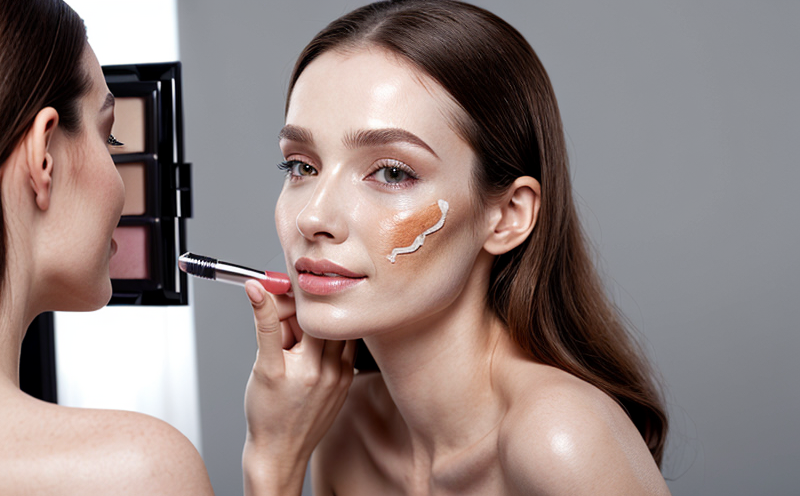Clinical Efficacy Testing of Anti-Acne Cosmetic Products
The clinical efficacy testing of anti-acne cosmetic products is a critical step in ensuring that cosmetics meet regulatory standards and effectively address acne. This process involves rigorous evaluation to determine the product's ability to reduce acne lesions, minimize inflammation, and improve skin health. Regulatory bodies such as the EC (for European Union regulations) and the Food and Drug Administration (FDA) in the United States mandate that cosmetic products undergo thorough testing before they can be marketed.
The testing process typically involves a series of controlled clinical trials where participants are randomly assigned to either use the test product or a placebo. This ensures that any observed effects are attributed to the product itself rather than external factors. Clinical efficacy testing is governed by several international standards, including ISO 15117 and ASTM F802.
The evaluation criteria include the reduction in inflammatory lesions (papules and pustules), non-inflammatory lesions (comedones, blackheads, whiteheads), and overall improvement of acne severity. These assessments are made using standardized scoring systems such as the GAGS or the ASS. The testing process is designed to be robust, ensuring that any observed effects are statistically significant and reproducible.
In addition to clinical trials, in vitro tests may also be conducted using cell cultures or animal models. These tests provide valuable insights into the product's potential to irritate skin or cause allergic reactions. For instance, the EN 1500 specifies procedures for determining the irritation potential of cosmetic products.
The testing process requires meticulous attention to detail. Specimen preparation involves collecting data on the baseline condition of participants' skin before starting the trial. This includes recording the number and type of lesions, as well as any other relevant clinical observations. The product is then applied under controlled conditions for a specified period, usually ranging from four to eight weeks.
Instrumentation plays a crucial role in the testing process. Skin cameras are used to document changes in the appearance of acne over time. Dermatologists and trained testers monitor participants' skin, recording any improvements or adverse reactions. At the end of the trial, data is collected and analyzed statistically to determine whether the product has met its intended efficacy goals.
Reporting the results of clinical trials is a detailed process that involves documenting all observed changes in participant's skin condition. This includes quantitative measures such as the percentage reduction in lesions or qualitative assessments based on visual observations. Regulatory bodies may require additional documentation, including adverse event reports and long-term follow-up studies to ensure the safety and efficacy of the product.
At Eurolab, our state-of-the-art facilities are equipped with the latest technology and expertise to conduct comprehensive clinical efficacy testing of anti-acne cosmetic products. Our team of dermatologists and clinical researchers ensures that every aspect of the testing process adheres to the highest standards. We use international standards such as ISO 15117, ASTM F802, and EN 1500 to guide our testing procedures. Our commitment to quality and accuracy ensures that the products we test meet regulatory requirements and are safe and effective.
The clinical efficacy testing process is not only essential for ensuring compliance with regulations but also for enhancing consumer confidence in anti-acne cosmetic products. By adhering to rigorous standards, Eurolab helps manufacturers produce high-quality products that effectively treat acne while minimizing potential side effects.
Eurolab Advantages
At Eurolab, we pride ourselves on providing exceptional clinical efficacy testing services for anti-acne cosmetic products. Our advantages include:
- State-of-the-Art Facilities: Equipped with the latest technology and equipment to ensure accurate and reliable results.
- Dedicated Dermatologists: Our team of experienced dermatologists ensures that every test is conducted under optimal conditions.
- Comprehensive Services: We offer a full range of testing services, from initial product formulation to final approval.
- Regulatory Compliance: Eurolab adheres to all relevant international standards and regulations, ensuring compliance with local and global requirements.
- Patient-Centric Approach: Our focus on the patient's well-being ensures that every test is conducted ethically and humanely.
- Rapid Turnaround Times: We understand the importance of timely results and strive to provide quick, accurate reports.
By choosing Eurolab for your clinical efficacy testing needs, you can be confident in our ability to deliver high-quality, reliable results that meet the highest standards.
Customer Impact and Satisfaction
- Informed Decision-Making: Our clients receive comprehensive reports that provide clear insights into the efficacy of their products. This enables them to make informed decisions about product development and marketing strategies.
- Increased Confidence in Products: With our rigorous testing, customers can be assured that their anti-acne cosmetic products are safe, effective, and compliant with regulatory standards.
- Enhanced Reputation: Successful clinical efficacy testing results contribute to a positive reputation among consumers and industry peers. This can lead to increased market share and brand loyalty.
- Cost Efficiency: By ensuring that products meet all necessary requirements before launch, our clients avoid costly rework or recalls after product release.
Customer satisfaction is paramount at Eurolab. Our focus on quality, accuracy, and timely reporting ensures that our clients receive the best possible service. We strive to exceed expectations by providing reliable results and fostering long-term partnerships.
Use Cases and Application Examples
- New Product Development: Eurolab assists in the development of new anti-acne cosmetic products by conducting clinical trials to determine their efficacy. This helps manufacturers identify potential issues early on and refine product formulations.
- Product Reformulation: When a manufacturer wants to reformulate an existing product, we conduct testing to ensure that the changes do not affect the product's efficacy or safety.
- Competitive Analysis: Eurolab can help manufacturers analyze competing products by conducting comparative clinical trials. This provides valuable insights into market trends and potential opportunities for innovation.
- Post-Marketing Surveillance: We also offer post-marketing surveillance services to monitor the long-term efficacy and safety of anti-acne cosmetic products. This helps ensure that products continue to meet regulatory standards over time.
These use cases demonstrate Eurolab's versatility in addressing various aspects of product development, reformulation, and market analysis for anti-acne cosmetic products.





